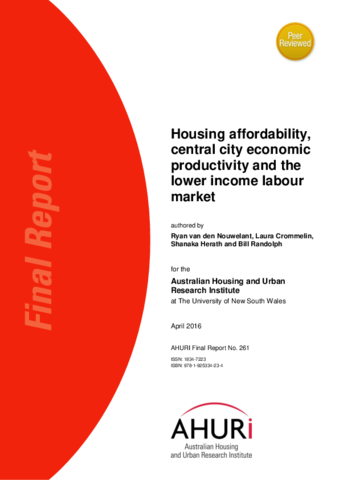This research examined whether the diminishing supply of affordable housing options for lower income (LI) workers near job-rich central city (CC) locations is having an impact on CC businesses and on the overall productivity of CC economies.
The research comprised a review of census and other data as to the housing market position of the LICC labour force in five of Australia’s key metropolitan areas (metros)—Perth, Darwin, Melbourne, Sydney and Brisbane—as well as a series of interviews with employers in Sydney’s CC and an analysis of the demand profile on recent infill development in the City of Sydney council area.
Six industries (hospitality, retail, support services (like travel and recruitment agencies), professional services (like legal and accounting), finance-insurance, and government services) were identified as likely to be affected by any shortage of LICC workers, based on a combination of the number of LICC workers, reliance on these workers, and competition for these workers from outside the CC.
This research suggests CC businesses, on the whole, are not currently constrained by a shortage of high-quality workers for lower income jobs as there are a number of mitigating factors at play. These factors—including a supply of short-term workers, lifestyle and professional benefits, and good transport links—have insulated businesses from the effects of high housing costs to a great extent. However, there are signs of constraints, particularly in the hospitality sector, that suggest labour market thickness is being affected by housing costs.


